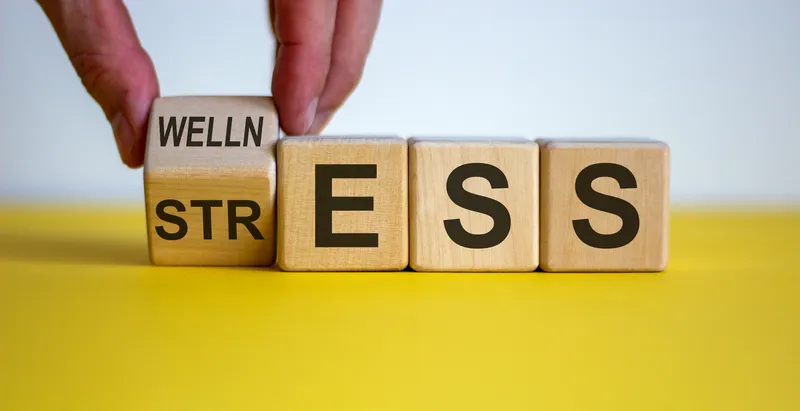5 simple ways to manage stress
In this article, we look at the different kinds of stress, how each of these can impact your physiology and psychology, and what are the top five ways to manage stress and improve your resilience.
Stress is everywhere. We hear the word a lot. But what is stress? It can be of so many kinds, and obviously, different for different people.
In this article, we look at the different kinds of stress, how each of these can impact your physiology and psychology, and what are the top five ways to manage stress and improve your resilience.
What are the different kinds of stress?
When we say that we are stressed, it is a physiological state of the body, which is in a heightened form of fight or flight, as would occur in a state of emergency. When the body thinks that it is in a state of emergency, it immediately shuts off non-essential functions. These include optimal functioning of the digestive, immune, and reproductive system.
Therefore, we can have poor immunity, poor gut health, and low hormones. These can then lead to a cascade of symptoms. This is what is known as vata aggravation in Ayurveda.
But what are the different ways in which we stress the nervous system? It is important to clarify this as often we might think that we do not have “stress”.
Lack of sleep is a major stress to the body, which imbalances the nervous system. When we do not sleep at the right time, or have optimal quality of sleep, we end up stressing the immune system. This means that we stay in a state of fight or flight, and anything that we do during our waking hours may not be enough to counter it. Lack of sound sleep is a trigger for vata imbalance. Since vata is the dosha that is most easy to go off balance, it can then also trigger all doshas to go off balance.

Image: Shutterstock
As much as none of us want to hear this, regular consumption of alcohol is a stress on the body. It dehydrates the system deep within and increases vata and pitta and can increase symptoms like anxiety. It increases ojas, so if there is a tendency for aggression and irritability and restlessness, it will increase this dramatically. It weakens agni and therefore raises vata and depletes ojas which is our vitality. Also, we must think of these as the difference between a very short-term enjoyment versus the long-term benefits of avoidance. Alcohol prevents nutrients from feeding the immune system and negatively affects white blood cell activity.
Excess Elecrto Magnetic Filed (EMF) time, including any form of stimulation such as scrolling on social media or watching high adrenaline television shows, can be a form of stress. The eyes are a doorway to the nervous system. The faster the eyes move, the more quickly the nervous system will get imbalanced. Vata has a quality of being mobile, so it can be stimulated very quickly. You might notice someone scrolling very quickly on their mobile touchscreen. This tendency will be greater when there is already vata imbalance.

Image source: Shutterstock
Stress can be from a diet that is deficient in nutrients. In vata imbalance, the craving patterns will be towards crunchy, dry, and airy snacks. These can include foods such as chips, crackers, and popcorn. These foods are light, and not grounding. Therefore, they increase the air quality, and make the nervous system imbalanced. When the diet does not have enough foods of the earth and water quality, which have the tendency to nourish, the poor nutrient intake can decrease the ability to have better resilience to stress. Ultimately, we will all have stressors around us, and it depends on whether we can navigate them.
Frequent exposure to antibiotics and medication is a stressor. These have a drying effect on the body. Since vata has a dry quality, like increases like. These increase vata and weaken the digestive fire. They lead to microbial loss, a suboptimal gut environment, and depressed immune function.

Image: Shutterstock
Ways to manage stress and improve your resilience
Improving our resilience to stress is not impossible. Ancient wisdom has the most wonderful recommendations to help us stay balanced. If we include some foundational basics, we can help keep our nervous system balanced.
- Timing of sleep is something that I keep talking about everywhere. Since there is a lot of information out there today on how we can continue to be a night owl, I feel this is creating further imbalance in many. Pitta time of the night is from 10.00 pm to 2.00 am. Sleeping before the pitta time begins, helps us to sleep without an overactive mind. Great tools to slow down are switching off devices by 7.00 p.m., if that is possible, and including a simple abhyanga at home. You do not need to go to a spa at all. Apply some warm sesame oil all over your body and have a warm bath after 10 minutes. This calms down the nervous system tremendously!
- Be intentional about alcohol. We all know that the amount of alcohol we consume on a night out can very quickly spiral out of our own control. Combining several different forms on one night, especially on an empty stomach, can make you more stressed the next day. Be intentional about the number of days you will consume alcohol, how much you can consume without feeling the ill aftereffects, and stay with this plan. As much as I do not want to mention this at the cost of being unpopular, I must say that I have had a few clients who practice everything right but binge on alcohol and they do show up as having poor resilience to stress.
- When it comes to stimulation, be intentional as well. Keep away all high adrenaline television shows in the late evenings and night. If you do enjoy them, watch one episode during the day and then watch a light-hearted comedy afterwards to calm down the nervous system. When you scroll on social media, avoid them after dark. Set a short time for yourself to scroll and avoid scrolling every time you pick up your phone. If you decide on scrolling from 1.00 pm to 1.30 pm, then stay with it. Move your finger on the tough screen slowly so that the eyes are not forced to see multiple images too quickly. If you do want to use the smartphone, use it to help you improve your ability to deal with stress. Listen to guided meditations, understand how to use your breath to calm down, and ground yourself with some guided yoga nidra.
- Ensure that you eat some grounding foods at the main meals of lunch and dinner. The gut needs some building foods, which include whole grains, legumes, vegetables, and healthy fats. The environment of the gut and the strength of the digestive fire play a key role in how stressed we feel. Keeping the fire going with warm cooked foods is the simplest way to have a better response to stress.

Image source: unsplash.com
- Avoid taking medication and antibiotics too frequently. India is rich with remedies for the common cold, pain, flu, headaches, and fever. Looking for the quick fix at the cost of long-term physical and emotional health, is a recipe for disaster. The less you medicate, the better the response to stress. Since many of the neurotransmitters such as serotonin are produced in a healthy gut, keeping our gut healthy is the best way to handle stress. The less you stress the gut, the more you can handle stress.
While this may sound simple, there is so much wealth right here. Many of these practices can take time to work through. Work your way through gradually. Begin wherever you can. Start with one practice and notice how it shifts the way you deal with stress. Begin with just reducing the speed of that social media trigger finger!
Edited by Megha Reddy
(Disclaimer: The views and opinions expressed in this article are those of the author and do not necessarily reflect the views of YourStory.)








